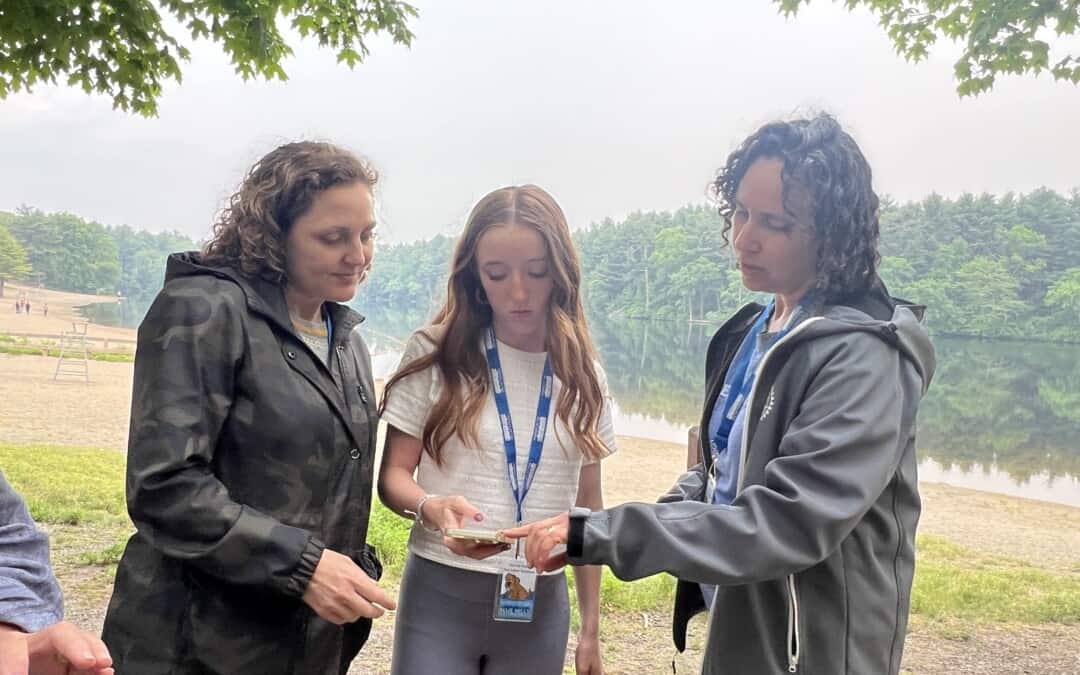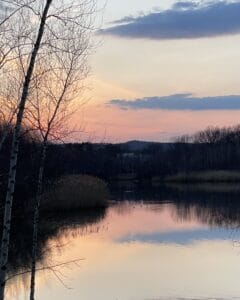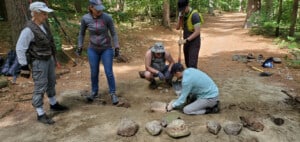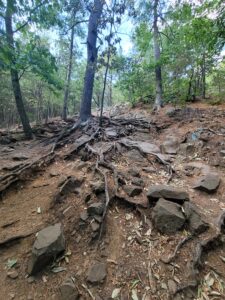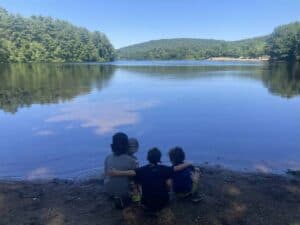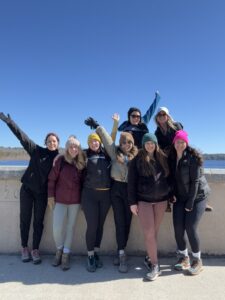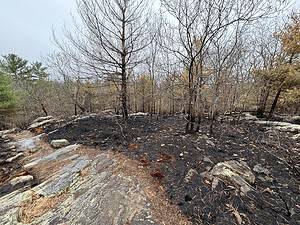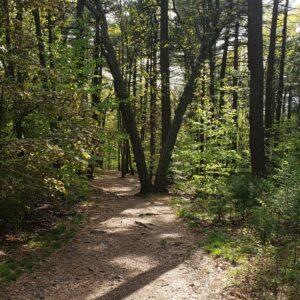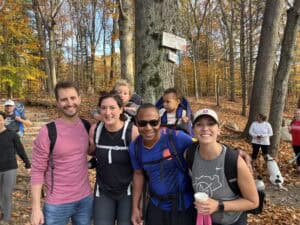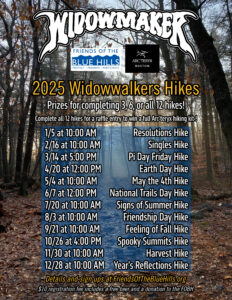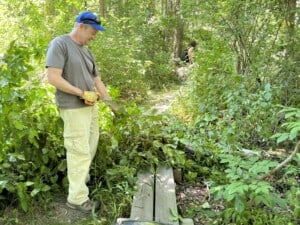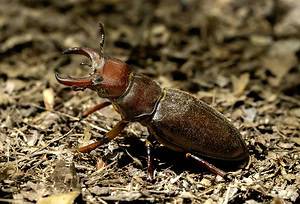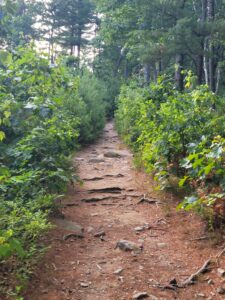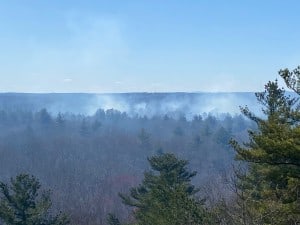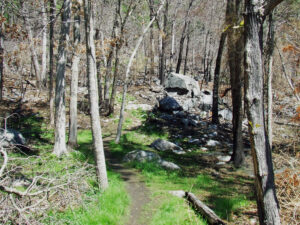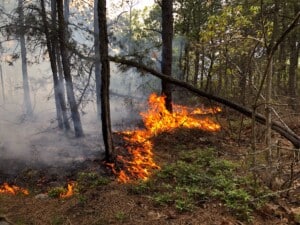Interview by Lauren Magee
Tell me a little bit about yourself and how you got involved with the Friends of the Blue Hills.
I live in Dedham and the Blue Hills is right there, so I often go to the Blue Hills just to go hiking by myself and with friends and family. I started to notice, particularly around the pandemic, that there seemed to be a lot more people utilizing the park space, which is amazing, but that also actually seemed to increase the amount of dog poop around.
Then I started to notice in the Friends of the Blue Hills’ flyers and things that they were mailing out to us, and that there was the opportunity to become a citizen scientist in the Poo-lution Solution campaign, and so I started getting involved with that and I’ve been doing that for about a year and a half now.
What’s your favorite thing to do when you visit the Blue Hills?
I just like to take different paths and try to find new places to go and explore. I love seeing how the seasons change.
When you think of the Blue Hills, which memory stands out the most and why?
I love just watching like the sunset over Houghton’s Pond and how it’s a predictable thing. It happens every day, but it’s always different in some capacity, like the leaves on the trees are turning colors, or there’s snow or ice or, you know, people swimming or less people present.
Can you tell me about your first memory of the Blue Hills?
My first memory of the Blue Hills is probably from high school. They did an after-school activity where you could sign up and go skiing at the Blue Hills, and I had never gone skiing before because I’d grown up in Ohio. So, I signed up for that and like once a week I think we would all pile into a bus and drive up to the Blue Hills and I would attempt to ski, and everybody else seemed to be experts. The same building that was there in the nineties is still there, where we’d go and check our skis out and stuff.
Why do you support the Friends of the Blue Hills?
I think having access to outdoor spaces is incredibly important for us humans, for our physical and health and wellbeing, and also for the planet, because we keep on developing areas and taking away the environment’s natural ability to thrive and take care of itself.
What made you decide to join the friends as a member?
Because protecting and maintaining these spaces is so important, and how important I feel it is for all members of our community to have access to areas like the Blue Hills.
If the Blue Hills were not protected and preserved, how might your life be different?
It’s in such close proximity, you know, I’ll leave work some days and just be like, ‘oh, I kind of just wanna go for a hike’ and I can just drive and go for a walk or a hike. So, it’s just easily accessible to me. But then also, like my neighborhood, we can see the Blue Hills from my neighborhood. So, if that was not trees, and we can see the ski slopes and everything, you know, if that was like condos or whatever, it would just feel more closed off. I feel like now, when I drive down my road and I see Blue Hills at the end of the street in the distance, it’s inspiring to me.
I feel like it wouldn’t be that way if it was like office buildings or condos or something like that. And all those little animals where would they go? Yeah, absolutely.
Can you talk a little bit more about your motivation to make a video tutorial for the Poo-lution Solution campaign app?
I’m a high school teacher, so it just seemed like an accessible way to get the information out to people that needed to know how to use the app, based on what I found and what the other volunteers in that program have found to be the best practices in terms of settings in the app and things like that.
As a teacher, videos are great. You can pause them, you can go back, you can put the subtitles on, you can change the closed captions to another language if necessary. It’s just more accessible, and people can access it whenever they need to and as many times as they need to.
Why is the pollution solution campaign so important to you?
I don’t like hiking in poop, and I don’t know if people realize how detrimental things like dog waste are to the ecological systems that are in an environment like the Blue Hills and in all natural environments.
I think some of it is because people let their dogs off leash, which then the dogs kind of wander into areas that might be protected or fragile. I go into nature to escape humanity and to be out in nature and to be in these environments on these paths and trails, and then to see a bag of dog poop hanging from a tree branch or left on a rock on the edge of the trail, it just pulls you back. I think if we can bring awareness to people about how their actions impact other people’s ability to enjoy these spaces and the health of these environments, we can hopefully get them to change their behaviors.
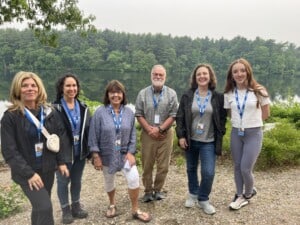
Elizabeth with participants of the Poo-lution Solution Training, where volunteers learned to collect data on bio-pollution (dog waste) in the park.
So, imagine if someone goes to the Blue Hills today for the first time ever, what would be the overwhelming feeling they would have and why?
I hope the feeling that they would have is that it’s accessible and welcoming in that there’s different areas for all different types of people to be in. These open and natural environments, whether it’s with little kids or swimming or these easier flat hikes versus, you know, climbing up sort of more challenging hikes that they could find a way to explore that felt comfortable to them. I would hope that they would feel just a little bit of peace and joy of being in nature.

